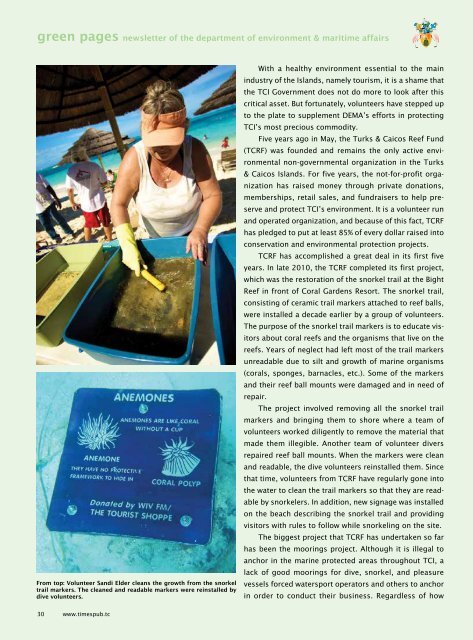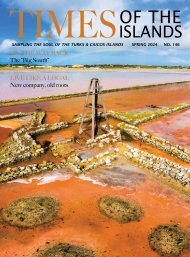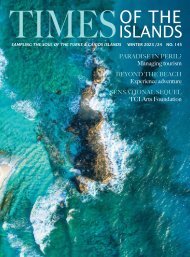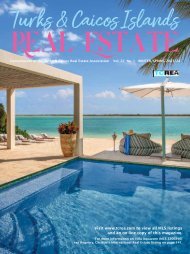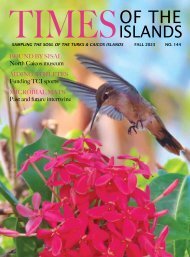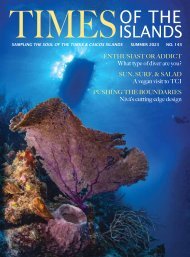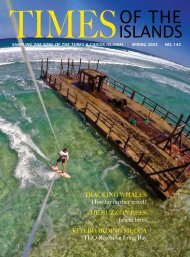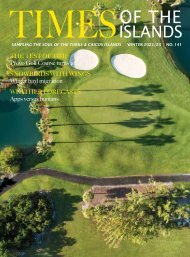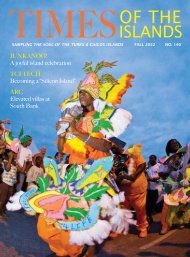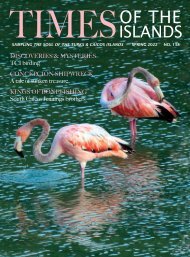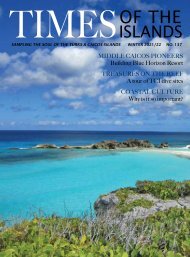Times of the Islands Summer 2015
Presents the "soul of the Turks & Caicos Islands" with in-depth features about local people, culture, history, environment, businesses, resorts, restaurants and activities.
Presents the "soul of the Turks & Caicos Islands" with in-depth features about local people, culture, history, environment, businesses, resorts, restaurants and activities.
Create successful ePaper yourself
Turn your PDF publications into a flip-book with our unique Google optimized e-Paper software.
green pages newsletter <strong>of</strong> <strong>the</strong> department <strong>of</strong> environment & maritime affairs<br />
green pages newsletter <strong>of</strong> <strong>the</strong> department <strong>of</strong> environment & maritime affairs<br />
From top: Volunteer Sandi Elder cleans <strong>the</strong> growth from <strong>the</strong> snorkel<br />
trail markers. The cleaned and readable markers were reinstalled by<br />
dive volunteers.<br />
With a healthy environment essential to <strong>the</strong> main<br />
industry <strong>of</strong> <strong>the</strong> <strong>Islands</strong>, namely tourism, it is a shame that<br />
<strong>the</strong> TCI Government does not do more to look after this<br />
critical asset. But fortunately, volunteers have stepped up<br />
to <strong>the</strong> plate to supplement DEMA’s efforts in protecting<br />
TCI’s most precious commodity.<br />
Five years ago in May, <strong>the</strong> Turks & Caicos Reef Fund<br />
(TCRF) was founded and remains <strong>the</strong> only active environmental<br />
non-governmental organization in <strong>the</strong> Turks<br />
& Caicos <strong>Islands</strong>. For five years, <strong>the</strong> not-for-pr<strong>of</strong>it organization<br />
has raised money through private donations,<br />
memberships, retail sales, and fundraisers to help preserve<br />
and protect TCI’s environment. It is a volunteer run<br />
and operated organization, and because <strong>of</strong> this fact, TCRF<br />
has pledged to put at least 85% <strong>of</strong> every dollar raised into<br />
conservation and environmental protection projects.<br />
TCRF has accomplished a great deal in its first five<br />
years. In late 2010, <strong>the</strong> TCRF completed its first project,<br />
which was <strong>the</strong> restoration <strong>of</strong> <strong>the</strong> snorkel trail at <strong>the</strong> Bight<br />
Reef in front <strong>of</strong> Coral Gardens Resort. The snorkel trail,<br />
consisting <strong>of</strong> ceramic trail markers attached to reef balls,<br />
were installed a decade earlier by a group <strong>of</strong> volunteers.<br />
The purpose <strong>of</strong> <strong>the</strong> snorkel trail markers is to educate visitors<br />
about coral reefs and <strong>the</strong> organisms that live on <strong>the</strong><br />
reefs. Years <strong>of</strong> neglect had left most <strong>of</strong> <strong>the</strong> trail markers<br />
unreadable due to silt and growth <strong>of</strong> marine organisms<br />
(corals, sponges, barnacles, etc.). Some <strong>of</strong> <strong>the</strong> markers<br />
and <strong>the</strong>ir reef ball mounts were damaged and in need <strong>of</strong><br />
repair.<br />
The project involved removing all <strong>the</strong> snorkel trail<br />
markers and bringing <strong>the</strong>m to shore where a team <strong>of</strong><br />
volunteers worked diligently to remove <strong>the</strong> material that<br />
made <strong>the</strong>m illegible. Ano<strong>the</strong>r team <strong>of</strong> volunteer divers<br />
repaired reef ball mounts. When <strong>the</strong> markers were clean<br />
and readable, <strong>the</strong> dive volunteers reinstalled <strong>the</strong>m. Since<br />
that time, volunteers from TCRF have regularly gone into<br />
<strong>the</strong> water to clean <strong>the</strong> trail markers so that <strong>the</strong>y are readable<br />
by snorkelers. In addition, new signage was installed<br />
on <strong>the</strong> beach describing <strong>the</strong> snorkel trail and providing<br />
visitors with rules to follow while snorkeling on <strong>the</strong> site.<br />
The biggest project that TCRF has undertaken so far<br />
has been <strong>the</strong> moorings project. Although it is illegal to<br />
anchor in <strong>the</strong> marine protected areas throughout TCI, a<br />
lack <strong>of</strong> good moorings for dive, snorkel, and pleasure<br />
vessels forced watersport operators and o<strong>the</strong>rs to anchor<br />
in order to conduct <strong>the</strong>ir business. Regardless <strong>of</strong> how<br />
careful <strong>the</strong> boat operators are, damage to <strong>the</strong> coral reefs<br />
happens when boats are anchoring every day and in some<br />
cases, multiple times a day.<br />
Recognizing that DEMA did not have <strong>the</strong> resources<br />
or manpower to fulfill its role <strong>of</strong> installing and maintaining<br />
moorings for dive and snorkel boats operating<br />
in <strong>the</strong> National Marine Parks and for visiting yachts,<br />
TCRF approached DEMA and <strong>of</strong>fered to help. In <strong>the</strong><br />
Fall <strong>of</strong> 2012, DEMA and TCRF signed a Memorandum<br />
<strong>of</strong> Understanding which designated TCRF as <strong>the</strong> lead<br />
non-governmental organization for <strong>the</strong> installation and<br />
maintenance <strong>of</strong> moorings in <strong>the</strong> Marine National Parks.<br />
Since that time, TCRF has worked with DEMA to replace<br />
all <strong>the</strong> inappropriate and environmentally unfriendly sea<br />
floor anchors (such as tractor tires filled with concrete<br />
and chains wrapped around coral heads) with proper sea<br />
floor anchors.<br />
As <strong>of</strong> April <strong>2015</strong>, all <strong>of</strong> <strong>the</strong> 50+ dive sites listed on<br />
<strong>the</strong> nautical charts now have proper sea floor anchors<br />
and mooring lines, plus <strong>the</strong>re are nearly 20 new dive sites<br />
and 13 snorkel boat moorings that have been installed<br />
by TCRF volunteers. As with anything manmade in <strong>the</strong><br />
ocean, regular maintenance is needed on all <strong>the</strong>se moorings,<br />
which TCRF has been happily doing with assistance<br />
from various scuba diving companies. Over <strong>the</strong> past three<br />
years, TCRF has invested over $150,000 in <strong>the</strong> moorings<br />
project.<br />
Two o<strong>the</strong>r projects to highlight are establishing a<br />
coral nursery and controlling invasive lionfish. Working<br />
with MerAngel Ecologic Services, <strong>the</strong> coral nursery project<br />
is an effort to save coral specimens that have been broken<br />
<strong>of</strong>f <strong>the</strong> reefs during storms or from vessels striking<br />
or anchoring on <strong>the</strong> reefs. These coral fragments can be<br />
used to help restore damaged areas on <strong>the</strong> TCI reefs or<br />
to create new near shore artificial reefs using reef balls.<br />
Reef balls are specially designed concrete structures<br />
that mimic <strong>the</strong> normal substrate upon which corals grow.<br />
In an effort to generate financial support for <strong>the</strong> coral<br />
nursery effort, TCRF has initiated an “Adopt-a-Coral” program.<br />
This provides an opportunity, for a fee <strong>of</strong> $50, to<br />
adopt a coral fragment that has been grown in <strong>the</strong> nursery<br />
and have that coral transplanted onto <strong>the</strong> Bight Reef.<br />
Each adopted coral is tagged with a number so that <strong>the</strong><br />
From top: TCRF volunteers installed new signage on <strong>the</strong> Bight Reef<br />
Beach. Proper sea floor anchors replaced environmentally “unfriendly”<br />
anchors at over 50 mooring sites. TCRF is working with local fishermen<br />
and restaurants to help control <strong>the</strong> invasive lionfish.<br />
30 www.timespub.tc <strong>Times</strong> <strong>of</strong> <strong>the</strong> <strong>Islands</strong> <strong>Summer</strong> <strong>2015</strong> 31


